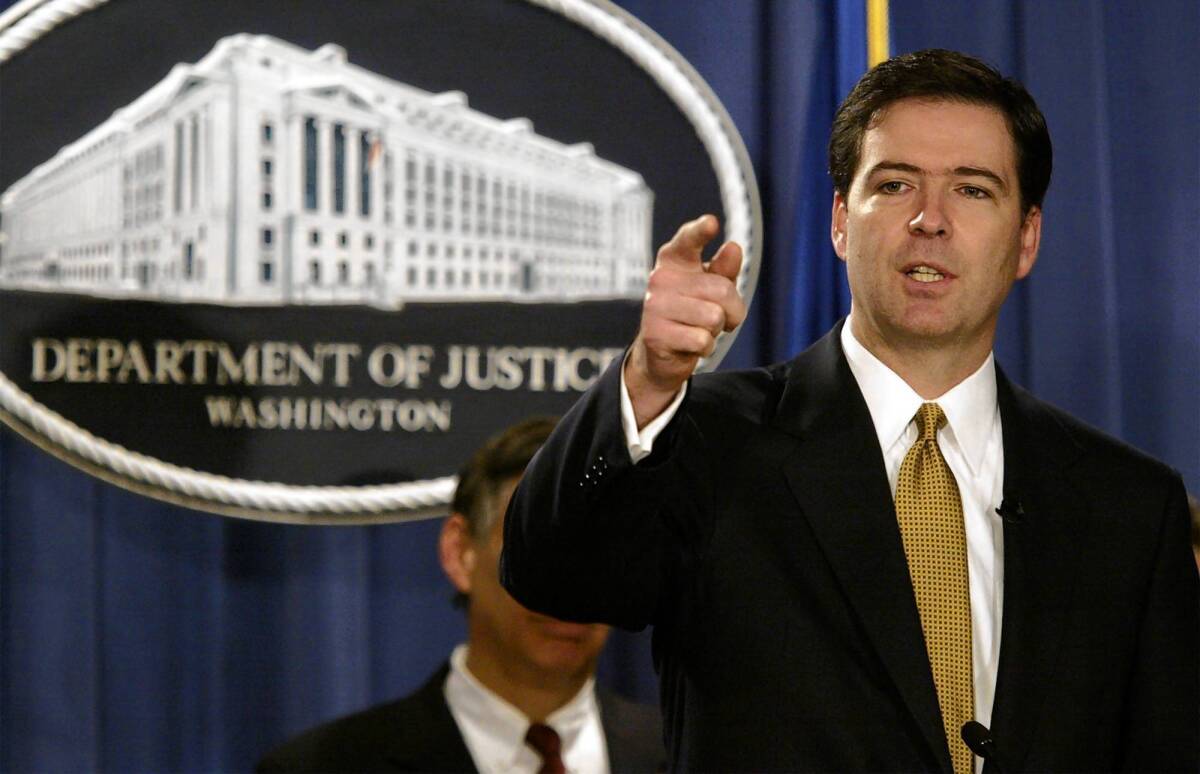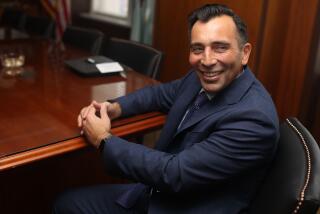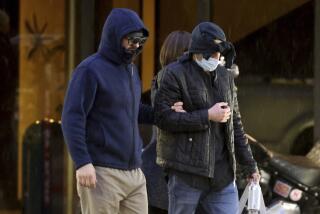Likely FBI nominee James Comey seen as levelheaded

WASHINGTON — Twenty years ago, James B. Comey was a young federal prosecutor in New York trying to put two Gambino brothers away for life. They were charged with murder, selling drugs, money laundering, racketeering — “the whole kitchen sink,” recalled Patrick J. Fitzgerald, Comey’s partner on the case.
Fitzgerald was a young prosecutor back then too, and, like Comey, he also would make a name for himself in the years ahead as a crusading attorney in the Justice Department. But in 1993 they were just a pair of rather green prosecutors taking on two top “capos” in one of the nation’s most notorious Mafia families. The case ended in a mistrial, but then Comey helped develop a new star witness whose testimony forced John and Joe Gambino to plead guilty.
“What I saw in the courtroom in six months of trial was Jim, very calm and seeing the big picture,” Fitzgerald said in an interview Thursday. “When everyone else hits the panic button, he is clear-headed. So if you’re going to be stuck inside a foxhole with somebody, he’s the one you want to be stuck with.”
Comey’s next “foxhole,” if nominated as expected by President Obama and confirmed by the Senate, will be a 10-year-term as director of the FBI. He would step into that office at what many in Washington and around the country call a perilous time.
A dozen years after the Sept. 11, 2001, terrorist attacks, the FBI has reinvented itself as an intelligence and counter-terrorism organization. Director Robert S. Mueller III took office just a week before the World Trade Center and Pentagon were attacked and had a record of no other terrorist strikes in the U.S. until last month, when three people were killed at the Boston Marathon.
Once in office, Comey would have to face the new reality created by the Boston bombings, which greatly raised the profile of hard-to-stop homegrown attacks. The fact that the bureau had interviewed but did not follow up on one of the alleged bombers before the attack illustrates the challenges confronting a new FBI director.
Fear of cyber-terrorism also hovers. Mueller and Homeland Security officials have warned for years that such attacks could create a computer meltdown with hackers closing banks, airports and potentially parts of the government.
Though Comey is highly respected and likely to be confirmed, he would have to answer tough questions from senators before he tackled those issues at the FBI.
Some senators already are questioning his more recent work in the private sector. Comey has been general counsel for Lockheed Martin at a time when the defense giant had sizable contracts with the FBI. He also helped oversee a large hedge fund as the FBI, and the U.S. attorney’s office in Manhattan, where he had been a prosecutor, has been vigorously prosecuting Wall Street abuses.
Liberal groups have questioned his role as deputy attorney general during the George W. Bush administration, when many civil rights organizations complained that the FBI and federal prosecutors overstepped the Constitution in their pursuit of alleged terrorists.
The Center for Constitutional Rights in New York, for instance, criticized a potential Comey nomination over his defense of a secret order that sent a Canadian man to Syria, where he was tortured.
“We’re not sure recycling former Bush administration officials is a good formula for protecting civil liberties at the FBI,” said Shayana Kadidal, a lawyer for the group.
At the ACLU, Executive Director Anthony D. Romero criticized Comey for agreeing to enhanced interrogation techniques for some detained terrorism suspects, including waterboarding, and the open-ended detention of a U.S. citizen in a military brig. Comey, Romero said, “approved programs that struck at the very core of who we all are as Americans.”
But those who applaud Obama’s anticipated selection of Comey contend that the 52-year-old lawyer is well prepared.
New Jersey’s GOP governor, Chris Christie, himself a former U.S. attorney, called the choice of Comey “outstanding.” He also over the years has recounted a story from when the two worked together: The conservative Comey, he said, once told him he met with the liberal New York Times editorial board “because it’s harder to hate up close.” Ever since, Christie said, “I’ve tried to live my life that way.”
His willingness to follow principle has won Comey respect. He stood up to the Bush White House when administration officials made a late-night hospital visit to try to get an ailing Atty. Gen. John Ashcroft to authorize the secret surveillance of telephone calls by the National Security Agency, to which Comey, in charge of the Justice Department in Ashcroft’s absence, objected. Amid threats that he and others would resign, the administration promised to adjust its policies.
In 2007, after he had left government service, Comey returned to Washington and testified on behalf of eight U.S. attorneys fired by the Bush administration for political reasons, and defended others such as Steven M. Biskupic of Wisconsin, who were in the cross hairs of conservative Republicans.
The political attacks on the prosecutors “really sticks in my craw,” Comey said in his congressional testimony.
Comey graduated from the College of William & Mary in Williamsburg, Va., in 1982 with a double major in chemistry and religion, according to the university. His senior thesis compared liberal theologian Reinhold Niebuhr and conservative televangelist Jerry Falwell. While there, he met his wife, Patrice.
In New York he took on the Gambinos and other crime figures. Later, in Richmond, Va., he was the top federal prosecutor and reduced the homicide rate by transferring gun cases to the federal courts for harsher sentences. He also took over the foundering investigation into the 1996 attack on the Khobar Towers in Saudi Arabia, in which 19 U.S. airmen were killed.
Three months after Sept. 11, Comey was named the U.S. attorney in New York, where many of the terrorism cases that followed were handled. Then for two years he worked as the No. 2 official at the Department of Justice, mainly under Ashcroft.
“He will coordinate and inspire the work of the bureau,” Ashcroft said in an interview. The FBI, Ashcroft acknowledged, “is a large organization. Their primary charge is to ensure the safety and freedom of Americans. And that inspiration on his part will be a big job.”
At 6 feet, 8 inches, Comey is remembered as an overpowering presence, smart and driven but also able to use humor to achieve results. “Put all that together, and you have the ability to lead,” said Robert J. Cleary, who first met Comey as a fellow assistant prosecutor in New York and went on be the U.S. attorney in New Jersey.
At Lockheed Martin, which Comey joined in 2005 after leaving the Justice Department, he served as general counsel. The company has a number of contracts with the FBI, including a deal to build an enhanced identification database called NGI, with the goal of adding facial recognition, palm prints and other biometric measures to the fingerprint system. The contract has been valued at about $1 billion.
“There are always concerns with the revolving-door issue. Any time you have an agency official with present or past or potential future ties involved in the contracting, there are potential ethical concerns raised there,” said Ginger McCall of the Electronic Privacy Information Center, which has sued the FBI for records related to the NGI program.
He left Lockheed Martin in 2010 and became general counsel at Bridgewater Associates of Westport, Conn., one of the world’s largest hedge funds. In March, he was named a director of the banking giant HSBC, which in December agreed to pay $1.9 billion in fines to settle a money laundering case brought by the federal government. The decision not to prosecute HSBC has been criticized by Congress.
In a Bridgewater video, Comey said he had been in meetings in the White House situation room in which he could tell people had opinions but kept quiet.
“One of my greatest frustrations about my time in government was watching people make decisions without having gotten that information out of people and without a recognition that they could be wrong.
“Doubt at a high level of government is seen as weakness,” he said. “And I thought doubt is strength. The wisest people I work with make decisions knowing they could be wrong.”
More to Read
Start your day right
Sign up for Essential California for news, features and recommendations from the L.A. Times and beyond in your inbox six days a week.
You may occasionally receive promotional content from the Los Angeles Times.









